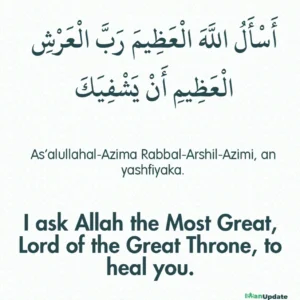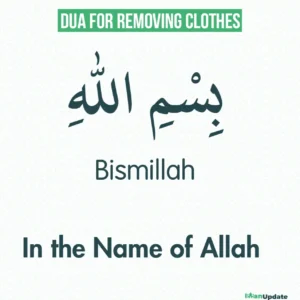Dua For Healing Wound According to the Sunnah

In Islam, healing is not just a physical process but a spiritual one as well. Our beloved Prophet Muhammad (PBUH) taught us to seek Allah’s help in every aspect of life, including healing from illnesses and wounds.
One of the ways to seek this healing is through dua (supplication), which is a form of prayer that strengthens our connection with Allah.
In this article, we will explore a dua for healing wounds as taught by the Prophet Muhammad (PBUH) in authentic Hadith.
This dua reflects the Sunnah (tradition) of the Prophet, offering both physical and spiritual benefits for those who recite it with faith and conviction.
Hadith on Healing Wounds
A Hadith reported by Imam Bukhari (Hadith no. 5742) and Muslim narrates that when a person was injured or had a sore, the Prophet Muhammad (PBUH) would moisten his finger with saliva, touch the ground, and apply the dust to the wound. While doing this, he would recite a special dua for healing.
This practice illustrates not only the spiritual reliance on Allah for healing but also highlights the purity of natural elements like dust, which the Prophet (PBUH) taught us to use as a purifier.
This shows the Prophet’s wisdom in combining both the physical and the spiritual aspects of healing, acknowledging that everything on earth is a creation of Allah and can serve a purpose.
READ ALSO: Taqabbalallahu Minna Wa Minkum in Arabic, Meaning, & Response
Dua For Healing Wound in Arabic
The dua recited by the Prophet (PBUH) during this practice is as follows:
تربة أرضنا، بريقة بعضنا، يُشفى سقيمنا، بإذن ربنا
Transliteration
Turbatu ardina, bi reeqati ba’dina, yushfa bihi saqeemuna, bi’idhni rabbina.
Meaning in English
“The dust of our earth, which has intermingled with the saliva of one of us would cure our patient with the permission of our Lord..”
Explanation of the Dua
This dua reflects several key concepts in Islamic healing. First, the dust of the earth is seen as a purifier, as mentioned in other Hadiths. The Prophet (PBUH) taught that dust is pure and can be used for cleansing, especially in the absence of water (for tayammum, the dry ablution).
By applying the dust to a wound, this act symbolizes not just physical healing but a connection to the purity of the earth created by Allah.
The saliva of a believer is also pure, and when combined with the dust, it represents the union of two pure things. Together, these elements, along with the firm belief in Allah’s power, serve as a means of healing.
When reciting this dua, one should place their full trust in Allah, knowing that He alone has the power to heal. This reflects the concept of Tawakkul (trust in Allah), where a believer turns to Allah in times of need, acknowledging that ultimate healing comes only from Him.
Spiritual Significance of the Dua
This dua is not merely a physical remedy but also a spiritual one. It demonstrates the importance of having faith and conviction in the practices of the Prophet (PBUH).
Healing through this dua is conditional upon a person’s belief in Allah’s power to cure and their sincere intention.
There are two important conditions for this dua to be effective:
- Strong Conviction: One must have absolute faith that Allah is the ultimate healer. The person reciting the dua must be convinced that Allah will cure the wound through this invocation.
- Patient’s Consent: The person being treated should also believe in the dua’s effectiveness. Without this belief, the dua may not have the intended effect because it is not performed with full trust in Allah’s power.
It is also worth noting that if this dua is performed as a trial without true faith in its effectiveness, it will not bring benefit.
As believers, we are reminded that when the heart is full of doubt, even the greatest signs of Allah do not increase us in faith, but rather in confusion. Therefore, this dua should be recited with full belief and sincerity.
Balance Between Faith and Action
While this dua is powerful, it is essential to understand the Islamic principle of combining faith with action.
The Prophet Muhammad (PBUH) encouraged his followers to take practical steps towards healing while also placing their trust in Allah. In this context, using this dua for healing does not exclude seeking medical attention.
Islam encourages believers to seek cures, whether through medicine, natural remedies, or spiritual means like dua.
Therefore, when reciting this dua, one should also ensure they take appropriate physical measures for healing, such as cleaning and dressing the wound and consulting a medical professional if necessary. This holistic approach of combining physical action with spiritual faith is highly emphasized in Islam.
Additional Dua for Healing in Islam
Apart from the specific dua for healing wounds, there are other powerful duas in Islam that can be recited for general healing. One such dua, reported in Sahih Bukhari and Sahih Muslim, is as follows:
اللَّهُمَّ رَبَّ النَّاسِ مُذْهِبَ الْبَاسِ اشْفِ أَنْتَ الشَّافِي لاَ شَافِيَ إِلاَّ أَنْتَ، شِفَاءً لاَ يُغَادِرُ سَقَمًا
Dua for Healing Transliteration:
“Allahumma rabban nas, adhhibi al-ba’sa, ishfi anta al-shafi, la shifa’a illa shifa’uk, shifa’an la yughadiru saqaman.”
Translation:
“O Allah, Lord of mankind, remove the harm and cure the patient, for You are the Healer. There is no cure except Your cure, a cure that leaves no illness behind.”
This dua is often recited for any form of illness or injury, whether physical or mental, and expresses the Muslim’s reliance on Allah as the ultimate source of healing. By reciting this, we acknowledge that while doctors and treatments may help, ultimate healing comes from Allah alone.
Conclusion: Relying on Allah for Healing
In conclusion, the dua for healing a wound as taught by the Prophet Muhammad (PBUH) is a reminder of the power of faith in the healing process. It combines the physical purity of dust and saliva with the spiritual purity of belief in Allah’s healing power. When recited with full conviction and trust in Allah, this dua can be a source of comfort and healing.
As believers, we are encouraged to seek both spiritual and physical remedies, placing our trust in Allah while also taking the necessary steps for treatment. Through dua, patience, and Tawakkul, we can hope for a complete recovery, knowing that Allah is the ultimate healer.






